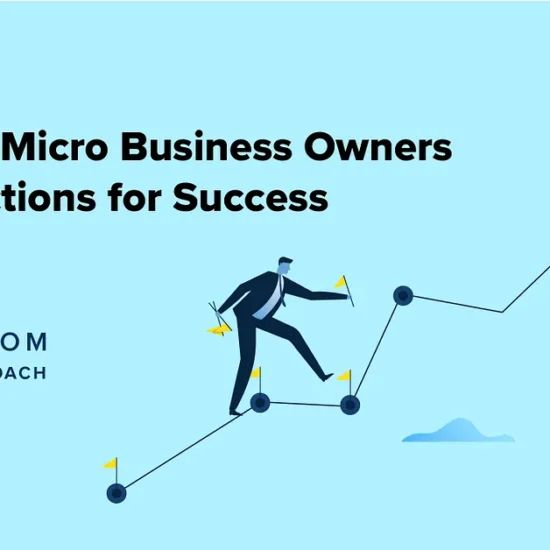In this dynamic and often unpredictable realm of entrepreneurship, it is not just about having passion and groundbreaking ideas; achieving profitable business goals is a multifaceted challenge that extends beyond hard work and vision. It is about steering through with a growth mindset and unwavering action approach.
Unlocking entrepreneurial success by leveraging two principles —
Principle #1 — Directional (combination mindset approach)
= outcome-driven focus + A data-driven attitude
Principle #2 — Sufficient (dual unwavering actions)
unreasonable persistence + massive actions
This blog further explores the above two principles that emerge as critical, offering insights into how they help entrepreneurs achieve profitable and sustained business success.
Principle#1 — Harnessing the Power of Directional
01 — Channeling the Strength of Solution-Driven Focus
The first pillar of Directional Actions is the ability to maintain a laser-like focus on desired solution outcomes. In this, the focus ensures that every effort is directed towards achieving defined objectives, minimising wasted resources and time.

Efficiency is doing things right; effectiveness is doing the right things.”
— Peter Drucker.
The focus here is on ensuring that every effort directly contributes to the end goal. This includes –
- Entrepreneurs define & communicate end goals and objectives — clearly
- Develop a strategic & meticulous plan to align actions with objectives
- Align resources and activities in accordance with driving the given goals
- Prioritising tasks that directly contribute to achieving these goals
- Keep distractions at bay and stay committed to the end result
02 — Embracing the Reality Check with Data-Driven Approach
The second pillar of directional Actions is data-driven decision-making, as in today’s information-driven age, being data-driven is non-negotiable for entrepreneurs.
A data-driven approach is distinct from sheerly staying informed. It is not just about consuming information; instead, continuously monitoring and reviewing the progress and integrating the relevant and up-to-date data to the outcomes of the actions against the goals. This regular assessment ensures the actions remain on course and are adjusted according to changing circumstances or new insights.

In God, we trust; all others must bring data.
– W. Edwards Deming
This aspect involves:
- Continuously gathering and analysing relevant data
- Recognising patterns and anticipating trends that keep the business agile and responsive.
- Using insights from this data to make informed decisions and strategies
- Adapting to new information and changing dynamics.
Principle#2 — Mastering the Art of Sufficient Actions
01- Power of Unreasonable Persistence
The relentless pursuit of goals despite challenges and setbacks. Maintaining steady efforts in business activities, from marketing to product development, regardless of difficulties, fosters resilience, builds character and often leads to breakthroughs.
This form of persistence is about maintaining momentum and determination, even when the odds seem stacked against you. Persistence is often the dividing line between successful and unsuccessful entrepreneurial ventures.

Persistence guarantees that results are inevitable.
– Paramahansa Yogananda
Unreasonable persistence refers to:
- A relentless drive to overcome obstacles and setbacks.
- The willingness to persevere through challenges and failures.
- A mindset that views every failure as a stepping stone to success.
- actions are scalable and sustainable in the long term.
02 —Adequacy of Massive Actions Unless Complete
The second pillar of Sufficient Action is the commitment to taking massive actions, sometimes unconventional actions, until goals are achieved. The concept of “sufficient actions” refers to undertaking enough of the right actions to ensure a task is accomplished or a goal is fully achieved.
Sufficient actions require a deeper understanding of the end goal and a commitment to not just performing tasks but ensuring these tasks effectively contribute to the final desired outcome.

There are no limits to what you can accomplish except the limits you place on your own thinking
— Brian Tracy
- Sufficient actions require a deeper understanding of the end goal and a commitment to not just performing tasks but ensuring these tasks effectively contribute to the final desired outcome.
- Sufficient and adequate resource allocations
- Implementing bold and decisive steps that propel the business forward
- Consistently executing and scaling efforts to match the magnitude of the goals.
- Continuing to push boundaries until the desired outcomes are realised.
- Implement bold strategies, invest significant resources in innovation, and do not settle for mediocrity, leading to significant market disruption.
Conclusion: Integrating Directional and Sufficient — Actions for Optimal Results and Entrepreneurial Mastery
In conclusion, the journey to achieving profitable business goals in entrepreneurship is multifaceted. It requires a balanced approach of Directional Action — being focused and data-driven, backed with Sufficient Actions — embodying persistence and actions unless complete.
The true power of these strategies lies in their integration. Directional Actions provide the focus for the roadmap, while Sufficient Actions fuel the journey. Together, they form a formidable framework for entrepreneurial success. By adopting these approaches, entrepreneurs can:
- Navigate the complexities of the business landscape with more outcome-driven focused actions
Make data-driven and integrated actions. - Cultivate resilience and adaptability in the face of challenges.
- Drive their ventures towards completion.



